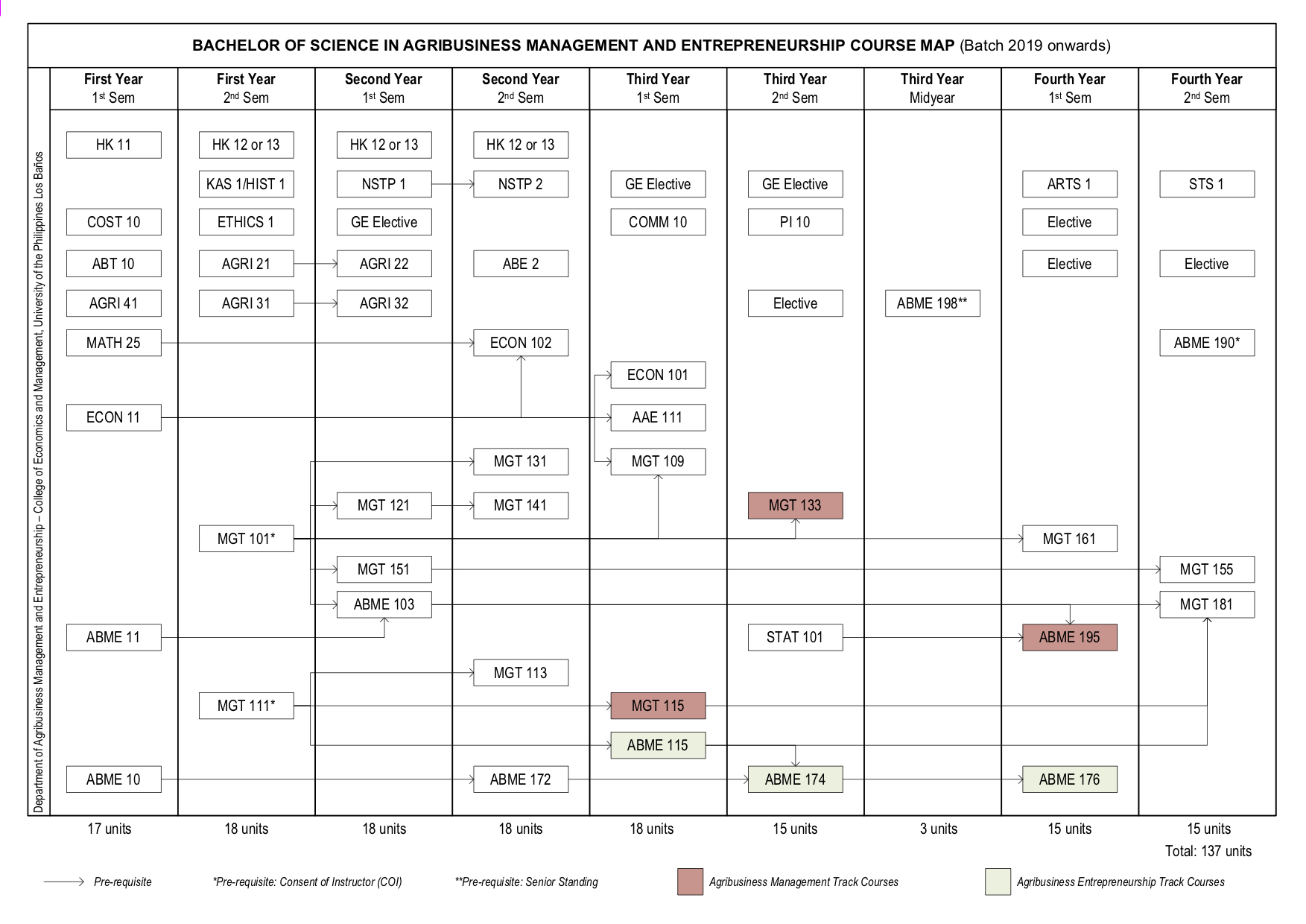Program Learning Outcomes
At the end of the program, Bachelor of Science in Agribusiness Management and Entrepreneurship graduates will be able to
- Articulate and discuss the latest developments in the specific field of practice
- Communicate effectively orally and in writing using both English and Filipino
- Work effectively and independently in multi-disciplinary and multi-cultural teams
- Act in recognition of professional, social, and ethical responsibility
- Preserve and promote “Filipino historical and cultural heritage”
- Develop the ability to get the most from experience
- Perform the various tasks in agribusiness confidently
- Diagnose and analyze agribusiness opportunities and threats in the environment
- Formulate and implement systems-oriented strategic plans and programs
- Monitor and evaluate agribusiness programs
- Provide leadership in creating business opportunities
- Use the knowledge, tools, and techniques necessary for the practice of management and entrepreneurship
- Develop and demonstrate managerial/entrepreneurial attitude/skills and systems orientation
- Explain the link between agriculture-related technologies and business and transform this link to business opportunities
- Engage in rational problem solving and decision-making
- Respond to economic, social and environmental concerns through advocacies related to agribusiness
- Lead with honor and excellence in public service and in fields of practice
Tracks
BS ABME students can choose either the Agribusiness Management Track or Agribusiness Entrepreneurship Track.
Agribusiness Management
Agribusiness management encompasses many aspects of the economy: agricultural producers, businesses that provide supplies and services to the producers, businesses that add value to agricultural products, and those that facilitate the marketing of agricultural products to an ever- growing marketplace”. This sector of the economy went through many changes and will continue to evolve in the future. For this reason, there is a need for prospective managers to be abreast with the developments in the agribusiness and related sectors. Graduates must be able to cope well with the dynamic nature of agribusiness. BSABME will combine management/ business courses with technical courses with emphasis on the uniqueness of agribusiness. Students will be trained on decision-making given managerial challenges.
Agribusiness Entrepreneurship
Courses Catalog
The curriculum is composed of 137 units of courses that could be completed in eight (8) semesters and one (1) midyear term. The courses are classified as follows:
General Education Courses and a Legislated Course (27 units). These courses provide the basic understanding of the various ways of knowing by promoting an active mind constantly growing and acquiring new perspectives. Its application extends to the concerns of society and those of humanity as a whole.
| General Education and Legislated Courses | Units | Sem Offered |
|---|---|---|
| KAS 1/HIST 1. Kasaysayan ng Pilipinas/Philippine History (3 units) | 3 | 1,2 |
| COMM 10. Critical Perspectives in Communication (3 units) | 3 | 1,2 |
| ARTS 1. Critical Perspectives in the Arts (3 units) | 3 | 1,2 |
| ETHICS 1. Ethics and Moral Reasoning in Everyday Life (3 units) | 1 | 1,2 |
| STS 1. Science, Technology and Society (3 units) | 3 | 1,2 |
| GE (Elective) | 3 | 1,2 |
| GE (Elective) | 3 | 1,2 |
| GE (Elective) | 3 | 1,2 |
| Legislated: PI 10. The Life and Works of Jose Rizal | 3 | 1,2 |
Foundation Courses (40 units). These are preparatory courses in the university. It aims to impart basic concepts, principles and techniques to students.
| Foundation Courses | Units | Sem Offered |
|---|---|---|
| AAE 111. Farm Management | 3 | 1,2 |
| ABE 2. Fundamentals of Agricultural Engineering II | 3 | 1,2 |
| ABT 10. Traditional and Modern Biotechnology: Principles and Applications | 3 | 1,2 |
| AGRI 21. Introduction to Animal Science | 3 | 1,2 |
| AGRI 22. Introduction to Livestock and Poultry Production | 3 | 1,2 |
| AGRI 31. Fundamentals of Crop Science I | 3 | 1,2 |
| AGRI 32. Fundamentals of Crop Science II | 3 | 1,2 |
| AGRI 41. Principles of Crop Protection | 3 | 1,2 |
| COST 10. Introduction to Collective Action | 1 | 1,2 |
| ECON 11. General Economics | 3 | 1,2 |
| ECON 101. Intermediate Macroeconomic Theory | 3 | 1,2 |
| ECON 102. Intermediate Microeconomic Theory | 3 | 1,2 |
| MATH 25. Fundamental Calculus | 3 | 1,2 |
| STAT 101. Statistical Methods | 3 | 1,2 |
Core Courses (49 units). These are common courses required to all undergraduate students in the program.
| Core Courses | Units | Sem Offered | ||||||
|---|---|---|---|---|---|---|---|---|
| ABME 10. Foundations of Entrepreneurship | 3 | 1,2 | ||||||
| ABME 11. Introduction to Agribusiness Management and Entrepreneurship | 1 | 1,2 | ||||||
| ABME 103. Agribusiness Systems and Modalities | 3 | 1,2 | ||||||
| ABME 172. Product Ideation and Creation | 3 | 1,2 | ||||||
| ABME 190. Special Problems | 3 | 1,2 | ||||||
| ABME 198. Internship | 3 | M | ||||||
| MGT 101. Concepts and Dynamics of Management | 3 | 1,2 | ||||||
| MGT 109. Managerial Economics | 3 | 1,2 | ||||||
| MGT 111. Principles of Accounting | 3 | 1,2 | ||||||
| MGT 113. Managerial Accounting | 3 | 1,2 | ||||||
| MGT 121. Quantitative Business Analysis | 3 | 1,2 | ||||||
| MGT 131. Introduction to Human Relations and Behavior in Organization | 3 | 1,2 | ||||||
| MGT 141. Fundamentals of Operations Management | 3 | 1,2 | ||||||
| MGT 151. Introduction to Marketing Management | 3 | 1,2 | ||||||
| MGT 155. International Marketing | 3 | 1,2 | ||||||
| MGT 161. Business Law | 3 | 1,2 | ||||||
| MGT 181 Fundamentals of Strategic Business Management | 3 | 1,2 |
Electives (12 units). These are courses chosen by a student from the list of courses offered by the university.
Track Courses (9 units). These are the courses unique to the track chosen by the students. The BSABME program has two tracks, namely: Agribusiness Management and Agribusiness Entrepreneurship.
| Tracks Courses | Units | Sem Offered |
|---|---|---|
| AGRIBUSINESS MANAGEMENT TRACK | ||
| ABME 195. Agribusiness Research Methodologies | 3 | 1,2 |
| MGT 115. Introduction to Financial Management | 3 | 1,2 |
| MGT 133. Human Resource Management | 3 | 2 |
| AGRIBUSINESS ENTREPRENEURSHIP TRACK | ||
| ABME 115. Entrepreneurial Finance | 3 | 1 |
| ABME 174. Business Planning | 3 | 2 |
| ABME 176. Starting and Managing Agribusiness Enterprises | 3 | 1 |
Course Map

